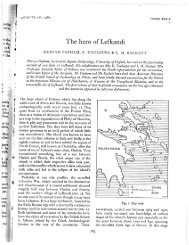September 2007 (PDF) - Classical & Near Eastern Studies ...
September 2007 (PDF) - Classical & Near Eastern Studies ...
September 2007 (PDF) - Classical & Near Eastern Studies ...
Create successful ePaper yourself
Turn your PDF publications into a flip-book with our unique Google optimized e-Paper software.
meaning of Article IV of the same Geneva Convention.<br />
That the existence of a final authority is not the sine qua<br />
non of a legal system can be demonstrated by recognizing all legal<br />
systems for what they are: games. Like other games, a legal system<br />
is a form of cooperative behavior. Players of games, wouldbe<br />
law-abiders, and litigants at law accept that their conduct is<br />
regulated by rules regarding game-play and another set of rules<br />
that constitute the game itself. In his classic study of human culture<br />
entitled Homo Ludens, Johan Huizinga suggested that ultimately<br />
all forms of culture and dynamic social organization<br />
appear to be games. All are ultimately voluntary: one can opt-out<br />
by defecting or by cheating, but one cannot continue to play a<br />
game without knowingly or unknowingly cooperating in the<br />
social relationship that is the game. To participate in a horizontal<br />
legal system is to accept that one has to play by its rules.<br />
A paradox that has attracted considerable attention in the<br />
literature of game theory is that no game's rules can be exhaustively<br />
defined. There are at least two reasons for this impossibility.<br />
First, when actually played, every game presents an infinity of<br />
contingencies that can never be fully anticipated. A persuasive<br />
exposition of this principle, with examples from baseball, is given<br />
by J. S. Russell in the Journal of the Philosophy of Sport 26 (1999) 27-<br />
49. In law this impossibility means that no statute or constitution,<br />
however general or specific its terms, can anticipate every contingency<br />
that may legitimately bear on the law's application. Second,<br />
even if it were possible to anticipate all contingencies, every rule<br />
must itself be interpreted by a decision maker, and that process of<br />
interpretation will itself by governed by meta-rules, which themselves<br />
require interpretation, and so forth in an infinite regression.<br />
As Stephen Sniderman has observed in a nascent web-journal (The<br />
Life of Games 1 [1999] 2-7), all games are played as if the rules were<br />
fully known and determinate. This tacit conspiracy of false belief<br />
is what makes game-playing possible. It is also what makes it possible<br />
to legislate, administer, and obey the law. In American legal<br />
literature much the same insight underlies the concept of "legal<br />
realism" and the scholarly field known as "critical legal studies."<br />
In judicial decision-making it is what justifies the use of "prudential"<br />
reasoning.<br />
Among the most inscrutable of the meta-rules that govern<br />
game-play are those that regulate the notion of "fair play."<br />
These rules are usually taken for granted, since to argue over them<br />
is to threaten the continuation of the game itself. In the Common<br />
Law tradition, a number of such meta-rules have been formalized<br />
as "maxims of equity," which are invoked and applied when "the<br />
law" is deemed to be inadequate or unfair in its outcomes. Much<br />
the same recognition of law's imperfection is expressed by the<br />
Roman maxim summum ius, summa iniuria ("all law [means] no justice"),<br />
and it has long been recognized that Roman praetorian law<br />
is a form of equity jurisprudence. Papinian famously described<br />
praetorian law as: "that which in the public interest the praetors<br />
have introduced in aid or supplementation or correction of<br />
[Roman law]." Dig. 1.1.7.1 (Papinian): trans. Watson. As a quasilegal<br />
concept, however, the notion of "equity" owes its origin to<br />
Greek ideas. For example, a doctrine of equity is formalized by<br />
Aristotle under the name of epieikeia, which he defines (EN 1137b)<br />
as a "correction of the law" (epanorthōma nomou). As compared<br />
with law itself, epieikeia is justice in the abstract, a justice that is<br />
ethically superior to any specific instance of justice as determined<br />
by the operation of pure law. The equitable man, according to<br />
Aristotle, is someone who forbears to exercise a merely technical<br />
legal right (ho mē akribodikaios, 1138a), someone who willingly<br />
accepts less than what may be technically his due under the law;<br />
in other words, someone who knows how to play the game.<br />
Equitable arguments are a way of challenging the law without<br />
destroying it. They keep the game alive when an impasse has<br />
been reached, which brings me back to Thucydidean diplomatic<br />
rhetoric.<br />
Perhaps the clearest and most fully articulated example<br />
of equitable argument in Thucydides is to be found in the speech<br />
attributed to the Corinthian ambassadors in their appearance<br />
before the Athenian Assembly in 434/3 BCE (I.37-43). The legal<br />
issue before the Assembly is whether Athens, despite Corinth's<br />
objections, can permissibly admit a powerful Corinthian colony<br />
(Corcyra) to the Athenian military alliance. This issue turns on the<br />
contested interpretation of a treaty term in the Thirty Year Truce<br />
of 445 BCE. Corinth's position is that granting Corcyra's request<br />
to accede to the Athenian alliance would violate the treaty. The<br />
Corinthian ambassadors present cogent legal arguments (the<br />
skepticism of certain modern scholars notwithstanding) in support<br />
of their interpretation of the treaty term. These arguments<br />
are collectively summarized by the Corinthians as "legal claims<br />
(dikaiōmata) that conform to the laws of the Hellenes and are dispositive<br />
[of the dispute]" (I.40). Having concluded their legal case,<br />
the Corinthians now adduce an equitable argument. Invoking a<br />
principle reciprocity, they ask the Athenians to give due return for<br />
two favors that Corinth formerly rendered to Athens. One of the<br />
favors is particularly emphasized because it too involved a disputed<br />
interpretation of what was permissible under the Thirty<br />
Year Truce. The favor was Corinth's refusal, in a meeting of the<br />
Peloponnesian League seven years before, to vote to sanction<br />
Athens for its military suppression of a defecting member of the<br />
Athenian alliance. Corinth suggests that the defecting state<br />
(Samos) had possessed a colorable right to quit the alliance.<br />
Corinth's vote to support Athens's suppression of Samos effectively<br />
resolved the disputed legal question in a manner that was<br />
favorable to Athens. A principle of reciprocity required Athens<br />
to return the favor in the present dispute regarding Corcyra.<br />
The Corinthians refer to this principle of reciprocity with<br />
the word charis, a term that certainly means both the rendering<br />
and the return of favors but also contains a hint of the equity idea.<br />
Favorinus, a philosopher and rhetorician of the early Antonine<br />
period, would later define charis to mean something similar to<br />
Aristotle's definition of epieikeia: "charis is forbearing to be strict in<br />
time of need" (Gellius NA I.3.27). Coming, as it does, in an argument<br />
that supplements what the Corinthians have called their<br />
"legal claims," the claim of a favor owed is an appeal to fair play.<br />
As such it approximates the equitable doctrine of "comity" in modern<br />
international law. Ian Brownlie defines the latter as the practice<br />
of "neighborliness, mutual respect, and the friendly waiver of<br />
technicalities" (Principles of International Law, 6th ed., Oxford 2003,<br />
28). For Corinth to argue that Athens owes the Corinthians a<br />
reciprocal favor is not to call into question the reality of customary<br />
law in the governance of Greek international relations. On the<br />
contrary, it is further evidence of the mature legal character of the<br />
international order (and disorder) that Thucydides depicts. It is<br />
the expression of an implicit belief that such law did exist and was<br />
supposed to be fair. Ultimately the Athenians decided not to<br />
return the favor, a decision which Corinth considered a breach of<br />
the Thirty Year Truce—not, I suggest, because the treaty was clear<br />
on the point at issue, but instead because the Athenians had effectively<br />
decided to quit the game.<br />
George Sheets holds both a Ph.D. in <strong>Classical</strong> <strong>Studies</strong> and a J.D., and is a<br />
member of the Minnesota Bar Association. His interests include historical<br />
linguistics, Greek and Latin literature, and legal history. For more information<br />
about his views on international law see his "Conceptualizing<br />
International Law in Thucydides," AJP 115 (1994): 51-73.<br />
12







